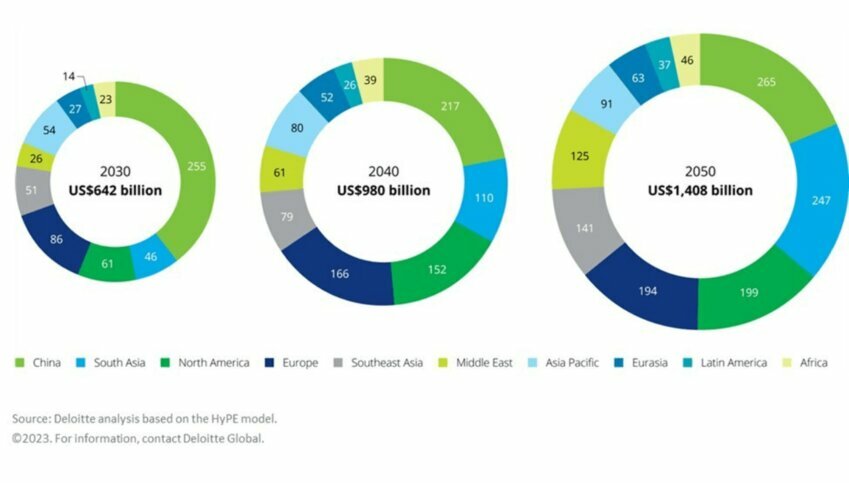 (Credit: Deloitte)
(Credit: Deloitte)A recent report from Deloitte reveals that the green hydrogen market is projected to surpass the value of the liquid natural gas trade by 2030, reaching a staggering $1.4 trillion per year by 2050. Green hydrogen, generated through the electrolysis of water using renewable energy sources, is anticipated to play into the market’s growth. Green hydrogen has the potential to decarbonize various industries, especially emission-intensive ones such as steel and transportation.
Deloitte's Hydrogen Pathway Explorer model provides comprehensive insights into the global hydrogen supply. According to the report, green hydrogen has the capacity to reduce cumulative carbon dioxide emissions by up to 85 gigatons by 2050, which is more than double the global carbon emissions recorded in 2021.
The forecasted market growth also highlights the significance of clean hydrogen for developing countries. With targeted investments, these nations could capture approximately 70% of the projected $1.4 trillion market by 2050, potentially creating up to 2 million jobs annually between 2030 and 2050.
Green hydrogen offers a viable solution for decarbonizing emissions-intensive sectors that are challenging to mitigate using traditional renewable energy sources. By embracing green hydrogen, countries can significantly reduce their carbon footprint while promoting sustainable economic growth.
However, implementing green hydrogen also comes with a number of challenges, including cost considerations, infrastructure requirements, and business complexities. Deloitte's report addresses these challenges and provides insights into infrastructure sizing, investment needs, and technology choices.
According to Deloitte's report, more than $9 trillion in major investments in the green hydrogen supply chain by 2050 is necessary for net-zero compliance. Policymakers and business leaders should collaborate to establish favorable market conditions and incentives to drive the adoption of clean hydrogen technologies.
The report emphasizes three key components: laying the market foundation through national and regional strategies, credible certification processes, and international cooperation; spurring action by setting clear targets, creating markets for clean hydrogen-based products, and providing fiscal incentives and subsidies; and ensuring long-term resilience by diversifying value chains, improving infrastructure design, and securing strategic reserves.
To support the transition to green hydrogen, Deloitte has established the Global Hydrogen Center of Excellence. This center aims to assist policymakers and businesses in scaling up clean hydrogen technologies and achieving large-scale decarbonization.
By providing insights, implementing solutions, and supporting project execution, Deloitte aims to contribute to the growth of the green hydrogen economy. Additionally, Deloitte has launched the Hydrogen Investment Corridor initiative, fostering collaboration among key hydrogen trade and investment pathways to accelerate the growth of this emerging industry.
Editor’s note: Don’t miss the virtual Environment+Energy Leader Solutions Summit ’23 on July 18-19. Learn tangible, innovative solutions to help with sustainable transitions across industries. Speakers from companies and organizations including Schneider Electric, Cority, Jump Associates, Mycocycle, Plainsight, LRQA, the Alliance to Save Energy, and many more will share tactics and lessons that can help you solve your energy management, sustainability, and ESG challenges. Learn more about the #EESummit23, and then register today!